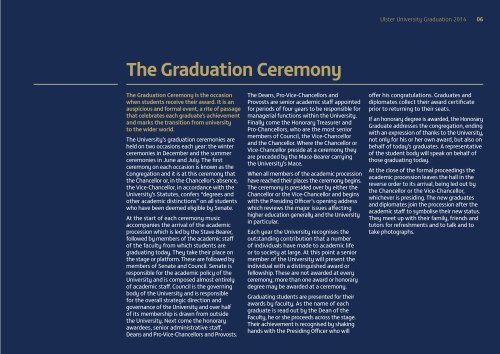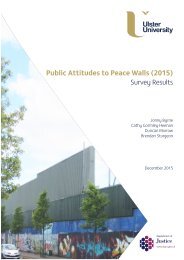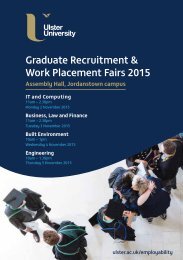16pj5TM
16pj5TM
16pj5TM
Create successful ePaper yourself
Turn your PDF publications into a flip-book with our unique Google optimized e-Paper software.
Ulster University Graduation 2014<br />
06<br />
The Graduation Ceremony<br />
The Graduation Ceremony is the occasion<br />
when students receive their award. It is an<br />
auspicious and formal event, a rite of passage<br />
that celebrates each graduate’s achievement<br />
and marks the transition from university<br />
to the wider world.<br />
The University’s graduation ceremonies are<br />
held on two occasions each year: the winter<br />
ceremonies in December and the summer<br />
ceremonies in June and July. The first<br />
ceremony on each occasion is known as the<br />
Congregation and it is at this ceremony that<br />
the Chancellor or, in the Chancellor’s absence,<br />
the Vice-Chancellor, in accordance with the<br />
University’s Statutes, confers “degrees and<br />
other academic distinctions” on all students<br />
who have been deemed eligible by Senate.<br />
At the start of each ceremony music<br />
accompanies the arrival of the academic<br />
procession which is led by the Stave-Bearer,<br />
followed by members of the academic staff<br />
of the faculty from which students are<br />
graduating today. They take their place on<br />
the stage or platform. These are followed by<br />
members of Senate and Council. Senate is<br />
responsible for the academic policy of the<br />
University and is composed almost entirely<br />
of academic staff. Council is the governing<br />
body of the University and is responsible<br />
for the overall strategic direction and<br />
governance of the University and over half<br />
of its membership is drawn from outside<br />
the University. Next come the honorary<br />
awardees, senior administrative staff,<br />
Deans and Pro-Vice-Chancellors and Provosts.<br />
The Deans, Pro-Vice-Chancellors and<br />
Provosts are senior academic staff appointed<br />
for periods of four years to be responsible for<br />
managerial functions within the University.<br />
Finally come the Honorary Treasurer and<br />
Pro-Chancellors, who are the most senior<br />
members of Council, the Vice-Chancellor<br />
and the Chancellor. Where the Chancellor or<br />
Vice-Chancellor preside at a ceremony they<br />
are preceded by the Mace-Bearer carrying<br />
the University’s Mace.<br />
When all members of the academic procession<br />
have reached their places the ceremony begins.<br />
The ceremony is presided over by either the<br />
Chancellor or the Vice-Chancellor and begins<br />
with the Presiding Officer’s opening address<br />
which reviews the major issues affecting<br />
higher education generally and the University<br />
in particular.<br />
Each year the University recognises the<br />
outstanding contribution that a number<br />
of individuals have made to academic life<br />
or to society at large. At this point a senior<br />
member of the University will present the<br />
individual with a distinguished award or<br />
fellowship. These are not awarded at every<br />
ceremony; more than one award or honorary<br />
degree may be awarded at a ceremony.<br />
Graduating students are presented for their<br />
awards by faculty. As the name of each<br />
graduate is read out by the Dean of the<br />
Faculty, he or she proceeds across the stage.<br />
Their achievement is recognised by shaking<br />
hands with the Presiding Officer who will<br />
offer his congratulations. Graduates and<br />
diplomates collect their award certificate<br />
prior to returning to their seats.<br />
If an honorary degree is awarded, the Honorary<br />
Graduate addresses the congregation, ending<br />
with an expression of thanks to the University,<br />
not only for his or her own award, but also on<br />
behalf of today’s graduates. A representative<br />
of the student body will speak on behalf of<br />
those graduating today.<br />
At the close of the formal proceedings the<br />
academic procession leaves the hall in the<br />
reverse order to its arrival, being led out by<br />
the Chancellor or the Vice-Chancellor,<br />
whichever is presiding. The new graduates<br />
and diplomates join the procession after the<br />
academic staff to symbolise their new status.<br />
They meet up with their family, friends and<br />
tutors for refreshments and to talk and to<br />
take photographs.




